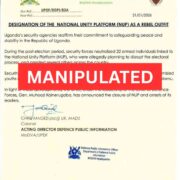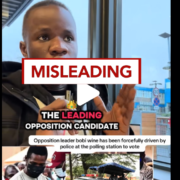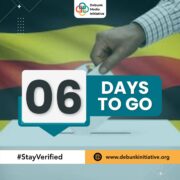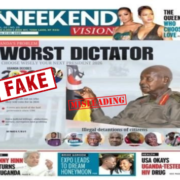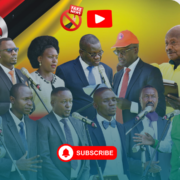REPORTING MISLEADING CLAIMS ABOUT KAWEMPE BY-ELECTIONS AND NAVIGATING VIOLENCE AGAINST JOURNALISTS
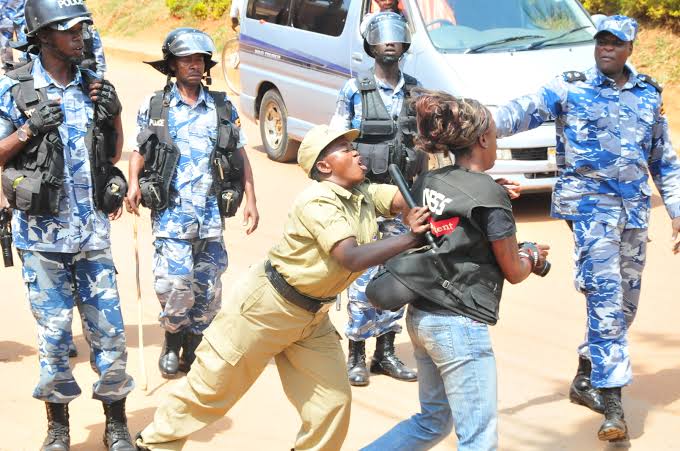
The brutal attacks on journalists covering the recent Kawempe North by-election in Uganda paint a disturbing picture of the challenges faced by media practitioners reporting on electoral processes in the country, gearing up for the 2026 general election.
Claim: Acting Uganda People’s Defence Forces (UPDF) Spokesperson, Chris Magezi, after these brutal attacks, issued a statement on X, saying, “UPDF concerned about alleged beating and harassment of journalists by members of the security forces.”
The statement further suggests an acknowledgement of the incidents but frames them as allegations under investigation. The Uganda Police Spokesperson, Kituuma Rusoke, stated that officers are briefed before operations, but some act outside of directives. By the time of this fact check’s compilation, none of the promises to handle rogue police officers who brutalised journalists have been fulfilled.
The government spokesperson and the Executive Director of Uganda Media Centre was quoted saying, ” Arrogance to a law enforcement officer whose instructions you don’t know is not a good thing. Journalists neither have nor enjoy an automatic right of way.”
We verify whether the brutal attacks on journalists did happen and if the government is owning up to them, given the evidence.
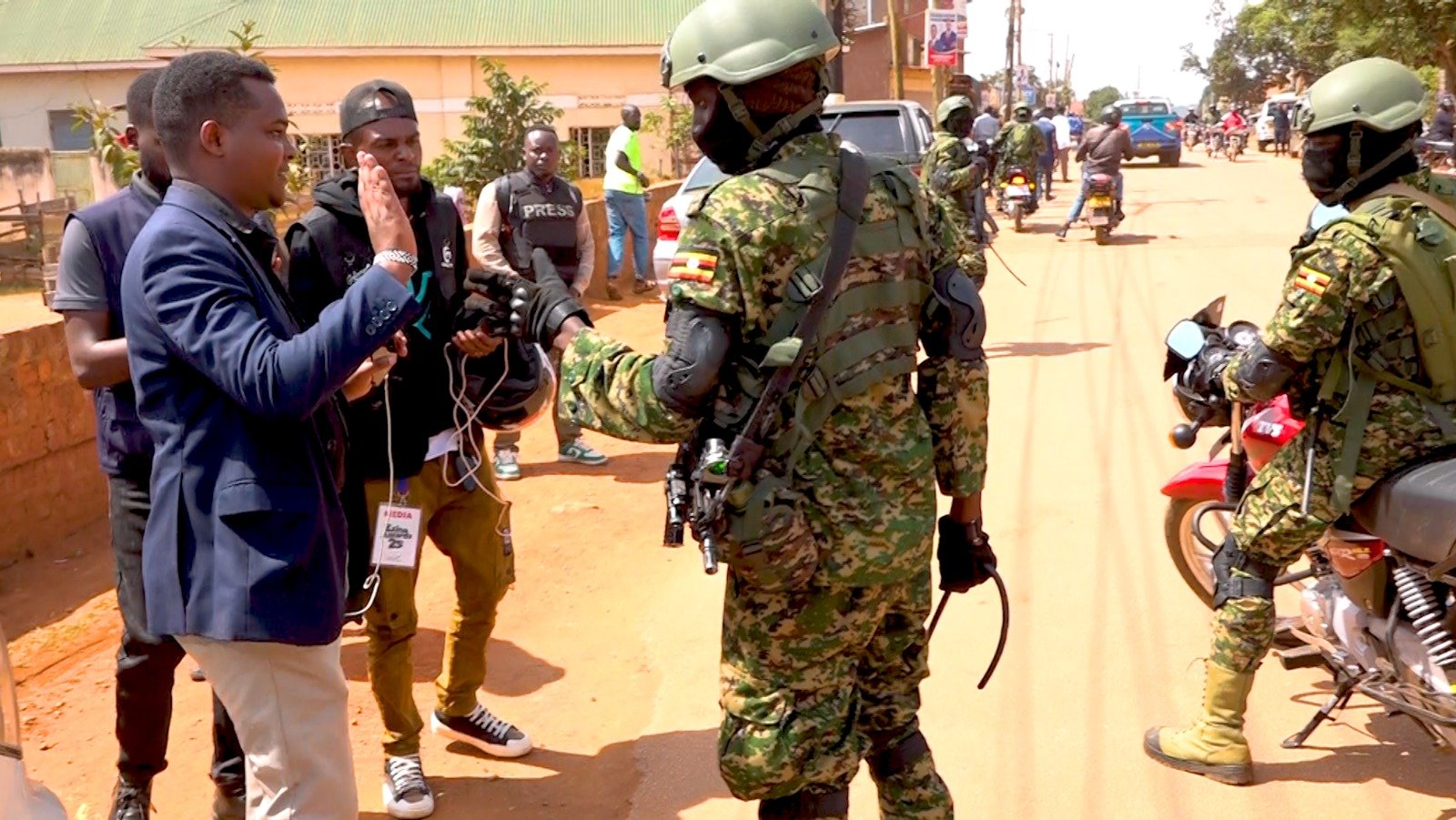
In the past two weeks alone, multiple journalists have been hospitalised, with some sustaining life-altering injuries, simply for documenting electoral events.
Ibrahim Miracle of Top TV was beaten so severely on February 26th that he required multiple surgeries for facial injuries, including damage to the bones around his eye. Spark TV cameraman Steven Kibwiika was assaulted twice – first on March 12 while covering suspected pre-ticking of ballot papers, and again more brutally the following day. Several other journalists from Nation Media Group and NBS TV were beaten, detained, or remain missing after being targeted by security forces while covering polling stations.
VIDEO: Our Senior Reporters, @SNabakooza1 and @MuhairweR, have withdrawn from covering the Kawempe North by-election due to attacks on several journalists by security operatives. #NBSUpdates #KawempeNorthByElection pic.twitter.com/599d9Z2LbE
— NBS Television (@nbstv) March 13, 2025
These incidents highlight the dangerous reality facing those who report on Ugandan elections and underscore the need for comprehensive guidelines on how to approach such coverage safely and ethically.
Stephen Kibwika, a journalist with NTV was beaten by JAT operatives, while ordering him to delete the footage he had recorded on camera as these brutes beat up NUP supporters.
They know that what they are doing is wrong, that’s why they keep targeting journalists who are… pic.twitter.com/IDkXdNSyRW— Joel Ssenyonyi (@JoelSsenyonyi) March 6, 2025
Documenting the Pattern of Violence
The violence against journalists during the Kawempe North by-election follows a disturbing pattern that has become increasingly common in Ugandan electoral processes. On February 26, 2025, Ibrahim Miracle was covering the arrest of an opposition party nominee when masked officers from Uganda’s Joint Anti-Terrorist Task Force (JAT) ordered him to stop filming. When he protested, an officer struck him in the face with a baton, knocking him into a ditch where he hit his head. This attack left him hospitalised with severe facial injuries, including a crack in one of the orbital bones around his eye.
@nbstvug The creation and legal framework that established the Joint Anti-Terrorism Task Force (JATT), recently deployed in Kawempe North. #NBSLiveAt9 #NBSUpdates ♬ original sound – NBS TV
Just days later, on March 12, Steven Kibwiika was assaulted by armed men while covering suspected ballot pre-ticking in Nammere, Kawempe Division. Found crawling on the ground in distress, he was evacuated to a hospital by the security detail of the Leader of the Opposition. The following day, Kibwiika was beaten again, this time more severely, when he returned to investigate a tip about pre-ticked ballots.
Journalists that were recording the vote rigging in Kawempe were badly beaten and their Cameras confiscated 😠🙌 pic.twitter.com/BkOZbYav4R
— The good gal 💥😍 ❤️🍷 (@Pliam_) March 12, 2025
The violence escalated further on March 13, with multiple journalists targeted at Kazo Angola polling station. Nation Media Group journalist Hasifah Nanvuma recounted being attacked by UPDF soldiers who beat her with sticks and damaged her camera, forcing her to hide in a toilet for safety. Three other NMG journalists Abubaker Lubowa, Raymond Tamale, and Dennis Kabugo were violently arrested. NBS TV journalists Francis Isaano and Hakim Wampamba were also detained.
“I was talking to people who had not voted when UPDF soldiers arrived in two patrol vehicles and started arresting some people. When some of the security operatives saw the camera, they came and attacked me, beating me with sticks and even damaging my camera. I ran into a nearby… pic.twitter.com/4vJ7Ym6vVU
— Daily Monitor (@DailyMonitor) March 13, 2025
VIDEO: @nbstv’s Photo Journalist @francis_isano has been hospitalized after being assaulted by security operatives while covering the ongoing Kawempe North by-election.
Details to follow…#NBSUpdates #KawempeNorthByElection pic.twitter.com/8SU4HK99rh
— NBS Television (@nbstv) March 13, 2025
Vidiyo: Bannamawulire ba Nation Media bateereddwa oluvannyuma lw’okutulugunyizibwa okuva lwebakwatiddwa.@RaymondTamale, atubuulidde ebibatuusiddwako ab’ebyokwerinda. #AgafaEyo pic.twitter.com/3PBHJYTUMi
— SPARK TV (@sparktvuganda) March 13, 2025
Institutional Response to the Violence
The attacks have drawn widespread condemnation from various quarters. In Parliament, Deputy Speaker Thomas Tayebwa questioned what could “provoke you to beat a journalist” after viewing footage of Ibrahim Miracle’s assault. The National Association of Broadcasters (NAB) released a statement warning that such attacks threaten press freedom and democracy in Uganda. Nation Media Group took the extraordinary step of temporarily withdrawing its journalists from covering the by-election to ensure their safety.
Joint statement from the media on security brutality pic.twitter.com/QWJMcwxoLs
— NAB Uganda (@Nab_Uganda) March 15, 2025
Our journalists covering the Kawempe North by-election have been assaulted, arrested, and had equipment confiscated. Press freedom is under attack! We shall not be silenced.
Full statement below. #JournalismIsNotACrime #NBSUpdates pic.twitter.com/fS320u3gjQ
— NBS Television (@nbstv) March 13, 2025
UPDATE: The African Centre for Media Excellence (ACME) has strongly condemned the violent attacks on journalists covering the Kawempe North by-election, calling it a blatant assault on press freedom and democratic participation.
Details 👇#NBSUpdates #KawempeNorthByElection pic.twitter.com/P39YcxLrrj
— NBS Television (@nbstv) March 13, 2025
Despite these condemnations, the response from security agencies has been lacklustre. While Uganda’s trade minister, David Bahati, promised the government would investigate Ibrahim Miracle’s assault, and the police claimed to be awaiting the victim’s statement, there is little evidence of meaningful action. Daniel Kalinaki of Nation Media Group noted that representations to senior security officials typically lead to “half-hearted apologies and promises of ‘never again'” that remain unfulfilled. Most troublingly, Ofwono Opondo, the Government Executive Director for Media, appeared to troll the assaulted journalists, suggesting that “arrogance to a law enforcement officer whose instructions you don’t know isn’t a good thing” and implying that journalists don’t enjoy special protections.
We have taken the difficult decision to temporarily withdraw our @DailyMonitor @ntvuganda journalists from covering the Kawempe North by-election for their safely because they are being targeted and attacked by armed soldiers and undercover security operatives.
— Daniel Kalinaki (@Kalinaki) March 13, 2025
Safety Considerations for Covering Ugandan Elections
Reporting on Ugandan elections requires a thorough understanding of the complex security landscape. While the Electoral Commission is responsible for organizing elections, as Justice Simon Byabakama noted, it is not responsible for maintaining law and order. That duty falls to the police, but in practice, multiple security agencies operate during elections with unclear mandates and chains of command.
The Joint Anti-Terrorist Task Force (JAT), whose primary mandate is counter-terrorism, has become increasingly involved in election security operations. JAT officers, who often operate masked and without clear identification, have been implicated in some of the most severe attacks on journalists. Additionally, UPDF soldiers and unidentified armed men in civilian clothes have participated in the crackdown on media personnel. This security environment has transformed election coverage into what Daniel Kalinaki describes as “military operations” for media houses, requiring bulletproof vests, helmets, documentation of blood groups, knowledge of evacuation routes, and reserve teams ready to deploy if primary teams are detained or injured.
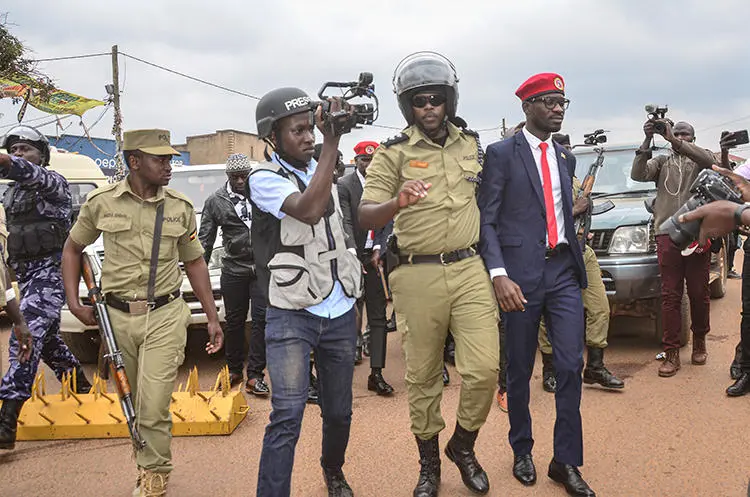
Practical Safety Protocols
Given these challenges, journalists covering Ugandan elections must adopt comprehensive safety protocols:
- First, work in teams whenever possible, with clear check-in procedures and emergency contacts established beforehand. Have a designated editor or safety coordinator aware of your location at all times. Journalists should carry proper press identification but be prepared to remove press vests and equipment quickly if targeted, as Hasifah Nanvuma did when hiding in a toilet to escape her attackers.
- Second, maintain awareness of potential flashpoints, particularly at polling stations where opposition candidates have strong support or where allegations of electoral malpractice have been made. Pre-planning should include identifying safe buildings, medical facilities, and evacuation routes in coverage areas.
- Third, use technology strategically, recognising that authorities may confiscate equipment or force the deletion of footage. Cloud backup solutions that automatically upload footage can prevent the loss of critical evidence. Some media houses now use multiple camera operators for important events; one obvious and one discreet to increase the chances of preserving documentation if one is targeted.
Why is security targeting journalists in the Kawempe North by election? I don’t get it.
I put these questions to Police Spokesperson @mkituuma. @nbstv #NBSLiveAt9 pic.twitter.com/xq2iDvtxef— Canary Mugume (@CanaryMugume) March 12, 2025
Ethical Reporting in High-Risk Environments
The violence against journalists creates a difficult ethical dilemma: how to fulfil the vital role of an electoral watchdog without endangering oneself or others. As Daniel Kalinaki notes, “Not sending journalists to witness abuses of power or electoral fraud is exactly what the violence is meant to achieve”. Yet media organizations have a duty of care to their staff. This tension requires thoughtful strategies that balance safety and journalistic responsibility.
Nation Media Group’s temporary withdrawal of journalists from the Kawempe North by-election coverage represents one approach—prioritizing immediate safety while publicly highlighting the assault on press freedom. An alternative strategy involves rotating journalists through high-risk assignments to minimize individual exposure while maintaining coverage.
I’m standing with all the brave Ugandan journalists attacked and/or detained by security services today while doing their job.
Authorities must immediately release those who are still in custody, apologize, and hold the rogue officers accountable. Journalism is not a crime
— Larry Madowo (@LarryMadowo) March 13, 2025
Another approach involves broadening the definition of who does journalism. As Kalinaki observes, “Technology has lowered the entry barrier into the field of capturing the rough first draft of history and given ordinary citizens the tools and platforms to report what they see”. Supporting citizen journalists with training and platforms can help maintain information flow even when professional journalists are targeted.
.@Kalinaki: Representations to and remonstrations with senior security agency officials often lead to the same half-hearted apologies and promises of ‘never again’. Every so often they throw in a football match or similar photo-op; the wounds heal, only to be burst open at the… pic.twitter.com/GB8ODrgbmn
— Daily Monitor (@DailyMonitor) March 13, 2025
Documenting Security Force Actions
When reporting on security force actions during elections, journalists must be particularly careful. Documentation should be precise and factual, avoiding inflammatory language while still accurately portraying events. When security forces commit violence, reporting should include efforts to identify the specific units involved and command structures rather than making generalised accusations against all security personnel.
https://t.co/pdKwMbHINY
PRESS STATEMENT pic.twitter.com/6v6Ac2Ri8l— Uganda Peoples’ Defence Forces (@MODVA_UPDF) March 14, 2025
Where possible, obtain official responses from police spokespersons, military representatives, and electoral officials. Kampala Metropolitan Police spokesperson Luke Owoyesigyire’s response regarding Ibrahim Miracle’s case that police were “aware of the incident and waiting to record the victim’s statement” provides important context about the official position, even if it appears inadequate.
Verdict: Based on this evidence, it is a fact that journalists were brutalised by Ugandan police. However, there has been no complete acceptance or owning up to these actions.

